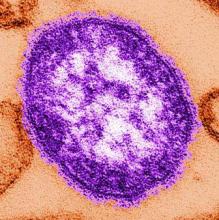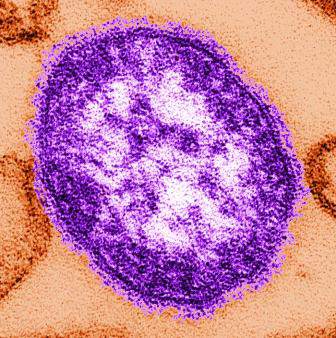User login
Reimmunization with a single dose of MMR in children with HIV who have undergone antiretroviral therapy in most cases leads to seroconversion to the measles component, Dr. Anju Seth, professor of pediatrics at Lady Hardinge Medical College, New Delhi, and her associates found.
HIV-infected children don’t respond well to primary immunization with measles, mumps and rubella (MMR) vaccine, and those who do respond tend to lose a protective titer of measles antibodies by age 2-3 years. Revaccinating these children after they undergo antiretroviral therapy (ART) might result in good seroconversion, so Dr. Seth and her associates enrolled 66 children with HIV aged 5-18 years who had undergone antiretroviral therapy for a mean 3.4 years whose mean CD4 count was 716 mcg/L.
At enrollment, 16 children tested positive for measles antibodies, 8 were equivocal, and 42 tested negative. Testing 8-12 weeks after reimmmunization with a single dose of MMR, 62 tested positive, 1 equivocal, and 3 tested negative. Between the seropositive and seronegative children, there was no difference in age, gender, duration of ART, CD4 count, or clinical stage. There were no serious adverse reactions to reimmunizations, the investigators reported. Read the full study at the Pediatric Infectious Disease Journal (2016 Jan;35[1]:e8-11).
Reimmunization with a single dose of MMR in children with HIV who have undergone antiretroviral therapy in most cases leads to seroconversion to the measles component, Dr. Anju Seth, professor of pediatrics at Lady Hardinge Medical College, New Delhi, and her associates found.
HIV-infected children don’t respond well to primary immunization with measles, mumps and rubella (MMR) vaccine, and those who do respond tend to lose a protective titer of measles antibodies by age 2-3 years. Revaccinating these children after they undergo antiretroviral therapy (ART) might result in good seroconversion, so Dr. Seth and her associates enrolled 66 children with HIV aged 5-18 years who had undergone antiretroviral therapy for a mean 3.4 years whose mean CD4 count was 716 mcg/L.
At enrollment, 16 children tested positive for measles antibodies, 8 were equivocal, and 42 tested negative. Testing 8-12 weeks after reimmmunization with a single dose of MMR, 62 tested positive, 1 equivocal, and 3 tested negative. Between the seropositive and seronegative children, there was no difference in age, gender, duration of ART, CD4 count, or clinical stage. There were no serious adverse reactions to reimmunizations, the investigators reported. Read the full study at the Pediatric Infectious Disease Journal (2016 Jan;35[1]:e8-11).
Reimmunization with a single dose of MMR in children with HIV who have undergone antiretroviral therapy in most cases leads to seroconversion to the measles component, Dr. Anju Seth, professor of pediatrics at Lady Hardinge Medical College, New Delhi, and her associates found.
HIV-infected children don’t respond well to primary immunization with measles, mumps and rubella (MMR) vaccine, and those who do respond tend to lose a protective titer of measles antibodies by age 2-3 years. Revaccinating these children after they undergo antiretroviral therapy (ART) might result in good seroconversion, so Dr. Seth and her associates enrolled 66 children with HIV aged 5-18 years who had undergone antiretroviral therapy for a mean 3.4 years whose mean CD4 count was 716 mcg/L.
At enrollment, 16 children tested positive for measles antibodies, 8 were equivocal, and 42 tested negative. Testing 8-12 weeks after reimmmunization with a single dose of MMR, 62 tested positive, 1 equivocal, and 3 tested negative. Between the seropositive and seronegative children, there was no difference in age, gender, duration of ART, CD4 count, or clinical stage. There were no serious adverse reactions to reimmunizations, the investigators reported. Read the full study at the Pediatric Infectious Disease Journal (2016 Jan;35[1]:e8-11).

